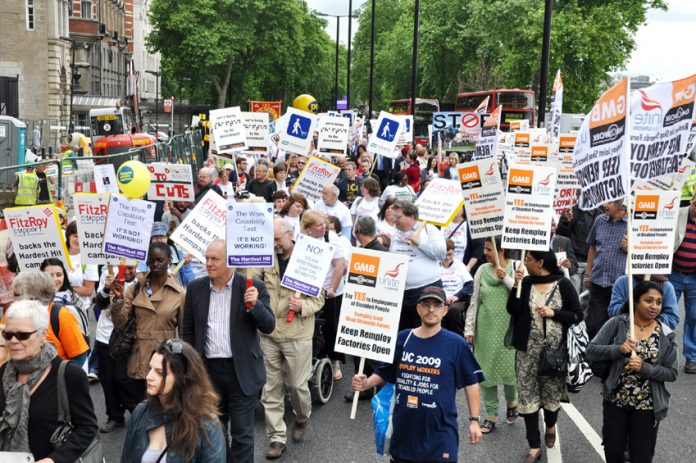‘WE now have the prospect of Remploy workers taking strike action to defend their jobs to avoid their certain destiny of being chucked on the economic scrapheap’ say the unions.
Members of GMB and Unite, employed by Remploy in 54 factories across the country, have voted by an overwhelming majority to take part in strikes and other industrial action to protest against the closure of the factories and disabled workers being forced into unemployment.
The trade union side in Remploy will give seven days notice with immediate effect for a programme of strikes and other action.
The majority for strike action was 79.5% of the vote in the GMB. The majority for action short of a strike was 87.3% in GMB. The figures for Unite are 59.7% in favour of strike action and 76.1% in favour of actionshort of a strike.
There was a Ministerial statement on 7th March the House of Commons to announce the closure of 36 of the 54 remaining Remploy sites with compulsory redundancy for 1,752 people of whom 1,518 are disabled.
The statement envisages the complete closure of all 54 factories in due course leading to 2,800 disabled workers jobs being lost. A 90 day consultation period was due to end last month (June) but it has been extended.
The Remploy factories scheduled to close in the first wave are as follows: Aberdare, Aberdeen, Abertillery, Acton, Ashington, Barking, Barrow, Birkenhead, Bolton, Bridgend, Bristol, Chesterfield, Cleator Moor, Croespenmaen, Edinburgh, Gateshead, Leeds, Leicester, Manchester, Merthyr Tydfil, Motherwell, Newcastle, North London, North Staffs, Oldham, Penzance, Pontefract, Poole, Preston, Southampton, Spennymoor, Springburn, Swansea, Wigan, Worksop and Wrexham.
Phil Davies, GMB National Secretary, said ‘The government’s intention to destroy thousands of disabled workers jobs in Remploy has given rise to an overwhelming vote for strike action against the proposed closures of their 54 factories.
‘These closures are going ahead without any consideration of the feelings and needs of these workers and their families or their future job prospects.
‘To close a factory that employs disabled people in the present economic climate is a sentence to life of unemployment and poverty.’
Kevin Hepworth, Unite National Officer, said ‘We now have the prospect of Remploy workers taking strike action to defend their jobs.
‘By taking strike action they are trying to avoid their certain destiny of being chucked on the economic scrapheap. They deserve the support of all trade unionists and the public in Britain.’
Meanwhile, DVLA offices to close despite widespread opposition.
The government’s confirmation yesterday that the popular and effective network of DVLA offices around the country will close by the end of next year is a further blow to communities where jobs and face-to-face services will be lost, the Public and Commercial Services union says.
The move, which will mean 1,200 job cuts and the loss of highly-prized direct services to the public and motor trade, comes despite widespread opposition including strikes by staff in the offices and a petition of 80,000 names.
The announcement by transport minister Justine Greening means the DVLA’s 39 local offices and 10 enforcement centres will close by December 2013.
But the union says the decision was clearly taken months ago because a public consultation found 79% of respondents wanted to keep the offices open.
The closures have nothing to do with improving services and stem solely from the government’s spending cuts, which require the DVLA to cut £100 million by 2015.
When these closures were proposed, DVLA claimed it would save £28m a year. However, it now indicates it is only likely to be £5.6 million a year.
The union points out that this figure does not include the loss of tax and national insurance revenues to the exchequer or losses from the expected increase in road tax evasion.
DVLA staff from the offices held two-hour walkouts on 1st and 22 June as part of month-long rolling strikes across the Department for Transport and its agencies.
Fearing for the effect on their businesses, many motor traders remain opposed to the closures and more than 80,000 people have signed a petition started by the union.
PCS general secretary Mark Serwotka said: ‘As a result of this government’s politically-motivated obsession with cuts, our communities stand to lose another 1,200 jobs and the public and traders will lose a service they rely on.
‘When our towns and cities are crying out for investment, not more cuts, it’s scandalous that ministers are ploughing ahead with closures that the vast majority of people have opposed.’
However, the PCS has welcomed the news that forests are set to remain public, following a review set up in the wake of mass anger against government plans to privatise them.
The Independent Forestry Panel’s final report, published last Wednesday, recommends that the public forest estate ‘should remain in public ownership and be defined in statute as land held in trust for the nation’.
The union, which represents more than 900 members in the Forestry Commission, joined the outpouring of anger against the government’s initial proposals in October 2010.
While there is other welcome news in the report around improving access for the public and developing the green economy, the union has concerns over the suggested break-up of the commission.
Staff fear that moving the public forest estate into a trust risks undermining democratic accountability and would mean their loss of civil service status.
In light of the report, the 25% cut to the commission’s budget, announced in the government’s 2010 spending review, should now be reversed the union says.
PCS general secretary Serwotka said: ‘The country was united in anger and opposition to the first ill-thought out and clearly politically-motivated plan to privatise our public forests.
‘We hope now the government will reverse its damaging budget cuts and talk to us about how best to ensure our forests are protected and developed so they can be enjoyed for generations to come.’
